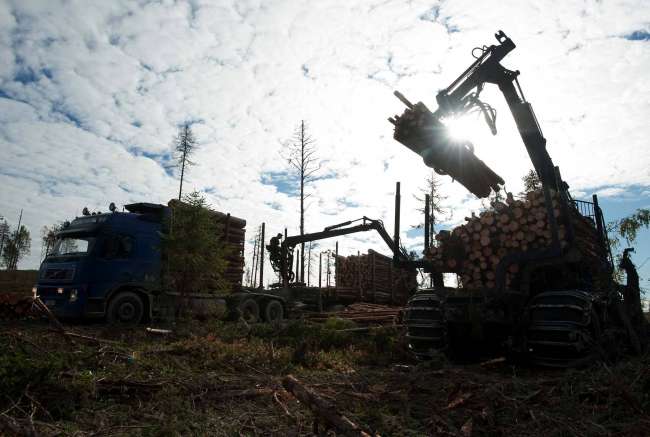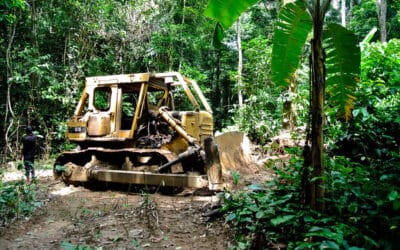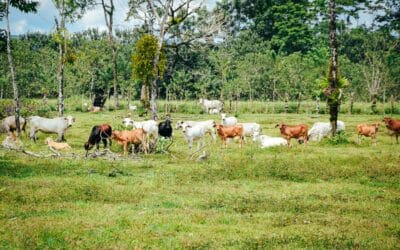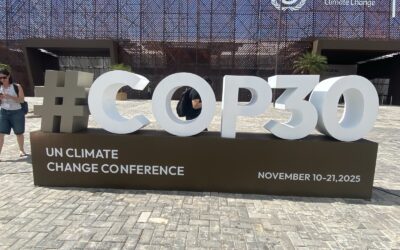16 October: On the occasion of World Food Day [1] a coalition of environmental and indigenous groups [2] denounces undue corporate influence over the UN Committee on World Food Security (CFS) [3], a crucial UN body in the field of food and nutrition. The CFS has seen increasing private sector involvement in recent years, with detrimental impacts on food security, human rights and environmental sustainability.
“The UN CFS is supposed to defend human rights, sustainable development and long-term food security, but the growing influence of meat, fertilizer, pesticide, feed and genetically modified seed companies is compromising this agenda,” says Mary Lou Malig, campaigns coordinator of the Global Forest Coalition.
The environmentalists are particularly concerned about the questionable membership of a newly constituted high level expert panel to advise the CFS on sustainable agricultural development for food security, including the role of livestock [4]. The head of the panel is a consultant for the International Meat Secretariat, a body that represents the interests of the world’s largest meat companies [5]. The panel’s report, currently in draft form, will be considered by CFS in 2016.
“A colossal increase in demand for meat and dairy by Northern consumers and developing country elites is by far the main cause of deforestation in Latin America, the continent with the highest deforestation rates on earth. It is also a driver of global climate change,” states Miguel Lovera from the Center of Rural Studies of the Catholic University of Asuncion, Paraguay, and one of GFC’s resource people. “The expansion of agro industrial feedstock and cattle production also displaces small-scale family farms that provide 80% of the food for humanity” [6].
“Instead of defending the interests of agribusiness, the CFS should focus on promoting small-scale agroecology and seed conservation, which are the cornerstones of local, national and global food sovereignty and security,” adds Andrey Laletin of Friends of the Siberian Forests and the Russian Socio-Ecological Union.
“As the former UN rapporteur on the Right to Food Olivier de Schutter pointed out [7], increased meat and dairy consumption is one of the biggest threats to long-term food security,” adds Mia MacDonald of the U.S.-based policy research group Brighter Green. “We will never be able to implement Sustainable Development Goal 2 on eradicating hunger and malnutrition [8] as long as we continue to use precious natural resources, including forests, scarce water, and the global climate to produce crops like soybeans, corn and cereals destined for the extremely wasteful agroindustrial livestock sector.”
NOTES
[1] World Food Day is celebrated around the world on 16 October every year, the date of the founding of the Food and Agriculture Organization of the United Nations in 1945. The day is celebrated globally to show support for food security, agriculture and eradicating hunger. See www.fao.org/world-food-day/home/en/
[2] Global Forest Coalition is a worldwide coalition of almost 80 NGOs and Indigenous peoples’ organizations from 50 different countries striving for rights-based, socially just forest conservation policies. See globalforestcoalition.org
[3] The Committee on World Food Security (CFS) is an intergovernmental body that serves as the foremost intergovernmental and international platform dealing with food security and nutrition. See www.fao.org/cfs/cfs-home/en/
[4] The High Level Panel of Experts (HLPE) on food security and nutrition has been created to advise the Committee on World Food Security (CFS) on various issues. See www.fao.org/cfs/cfs-hlpe/about-the-hlpe/en/
[5] Project team leader Wilfrid Legg is associated as a consultant for the International Meat Secretariat (IMS), a non-profit organization that represents the global meat and livestock sector. On its website the IMS presents itself as “One voice for the world meat & livestock sector”. See http://www.meat-ims.org
[6] See various GFC reports like https://globalforestcoalition.org/wp-content/uploads/2015/01/GFC-BG-Livestock-Landscape-Threat-web.pdf or https://globalforestcoalition.org/wp-content/uploads/2014/03/Impacts-Soy-Cattle-3-ML-1.pdf
[7] Report of the Special Rapporteur on the right to food 2014, The transformative potential of the right to food http://www.srfood.org/images/stories/pdf/officialreports/20140310_finalreport_en.pdf
[8] The SDGs recently adopted by the UN in September 2015 have been agreed as a follow on from the Millennium Development Goals (MDGs) to fulfill goals like ending global poverty, deforestation, hunger and gender inequality by 2030, ensuring sustainable consumption and production patterns, combatting climate change, promoting sustainable agriculture among others See all SDG goals, targets and indicators at https://sustainabledevelopment.un.org/focussdgs.html
Contact Information:
Ashlesha Khadse, Media Officer, GFC: +52 967 111 0424 , ashlesha@globalforestcoalition.org
Mary Lou Malig, Campaigns Coordinator, GFC: marylouisemalig@globalforestcoalition.org
Miguel Lovera, Resource Person, GFC and Centro De Estudios E Investigaciones De Derecho Rural Y Reforma Agraria, Universidad Católica, Paraguay: miguel.lovera@globalforestcoalition.org
Website: https://globalforestcoalition.org/media
Social media
Facebook: bit.ly/gfc123
Instagram: global.forest
Twitter: @gfc123




